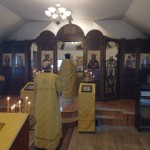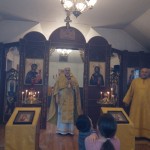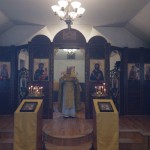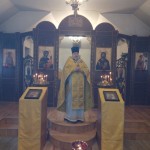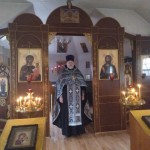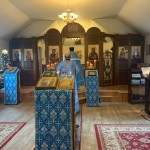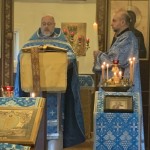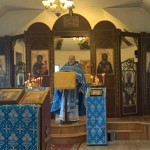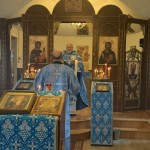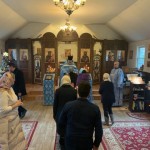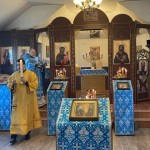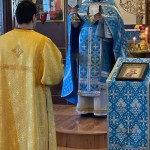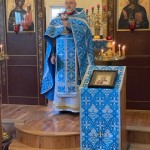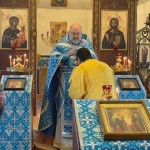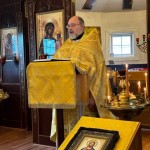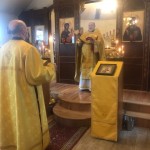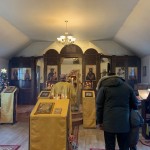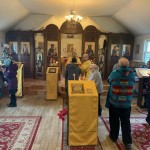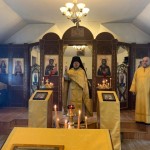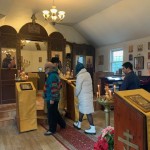On the Cheesefare Sunday the Church commemorates the exile of Adam from paradise. This day is also known as the Forgiveness Sunday because Orthodox Christians ask mutual forgiveness before they begin the spiritual journey of the Great Lent. On this day, on February 26, St. George parish had services in our temple. Our Rector, Archpriest Igor Tarasov celebrated the Divine Liturgy. After the Gospel lesson he preached the following homily:
“Dear brothers and sisters in Christ! Today is Cheesefare Sunday, the last Sunday before Lent. Tomorrow we will begin that special season, a time of fasting and spiritual endeavors. Before we do so, the Church wishes us to remember the fall of Adam and Eve and how they lost Paradise by eating the forbidden fruit, which is why we fast, eating only “the permitted fruit”. How exactly did that fall happen?”
“We know from the Scriptures that the first man and the first woman lived in Paradise, in Eden. We know also that they walked with God, meaning that they lived in harmony and communion with God, suffering neither sin, nor sorrow, neither aging, nor death. We know also that they disobeyed God. The cause of their disobedience was in the temptation of pride: they thought that they knew better than their Creator. They thought that they could disobey Him and benefit from that. The fact that the first man and first woman preferred to trust in themselves, rather than in God, to trust in their proud self-importance, led to their fall from communion with God. But once they had rejected God, they also rejected freedom from sin and freedom from sorrow, rejected freedom from aging and freedom from death”.
“The cure for their fall was made clear to them. It was in doing the opposite of all they had done. Instead of disobedience, they needed obedience; instead of pride, they needed humility. In other words, they had to turn back on what they had done in repentance and ask forgiveness. At first they had been unable to do this. When God had first spoken to Adam and Eve after their act of disobedience, Adam blamed Eve, and Eve blamed the serpent. Neither had the humility to take responsibility for his errors and ask for forgiveness. It was not that God did not know what they had done; it was simply that He wanted to give them the opportunity to ask Him, and to ask each other, for forgiveness. Instead they blamed each other and in the process blamed God their Creator”.
“To us, as children of Adam and Eve, God also gives opportunities to ask for forgiveness, as Adam and Eve should have done. He gives us the Sacrament of Confession. Confession does not exist because God wants to hear from us what we have done. He already knows that. Confession exists because God is giving us an opportunity to correct our mistakes and failings. He wants us to ask for forgiveness, so that we can then take strength from Him through the prayers of the priest, so as to clean ourselves and strive not to repeat our mistakes. God does not need our confession, but we do. Every confession is a repeating of that opportunity given to Adam and Eve in Eden, to ask God for forgiveness. And unlike human beings, God always forgives those who sincerely, with repentance, ask Him for forgiveness”.
“I once read what some child, probably a Sunday school student, said, “Forgiveness is like a fragrance the flower gives when it is being trampled”. What a beautiful saying! Adam and Eve trampled God’s love but God was ready to forgive. We also trample God’s love by our sins, but He is giving us a fragrance of forgiveness, an aroma of His compassionate love in the Mystery of Confession. How could we reject such love?”
“However, before we ask forgiveness of God, we first have to ask forgiveness of each other. And just at this time, on Cheesefare Sunday, it is a custom of Orthodox throughout the world to come to Confession, to ask each other for forgiveness. We can ask forgiveness of those who are not here by visiting them or calling them. But of those who are here, we can now ask forgiveness directly, for all our errors towards them in thought, word or deed, whether conscious or unconscious. On the other hand, let us imitate God in granting forgiveness to our fellow brothers and sisters. Let us engulf them with a fragrance of our forgiving love”.
“Dear brothers and sisters! The Lord said in today’s Gospel lesson, “If you forgive men their trespasses, your heavenly Father will also forgive you. But if you do not forgive men their trespasses, neither will your Father forgive your trespasses” (Mt. 6, 14-15). For if we do not first ask each other for forgiveness, we cannot ask God for forgiveness. And without forgiveness, there is no way back into Paradise for any of us. Let us then forgive to be forgiven and to regain our lost blessedness with our ever-loving Creator!”
During the Litany of Fervent Supplication the Rector had a petition for the suffering country of Ukraine and its people. He also added a commemoration of the “suffering Ukrainian country” at the Great Entrance.
During preparation for Holy Communion the choir director prayerfully sang Psalm 33.
Following the Divine Liturgy the Rector performed Vespers with the Rite of Forgiveness. After the singing of the Great Prokimenon he changed his priestly vestments to the Lenten color of black.
After the dismissal of Vespers Fr. Igor preached a sermon in Russian and English about the importance of forgiveness at the beginning of Lenten journey towards Holy Pascha.
Following the services of this special day Rector and parishioners joined at the Blini Luncheon. All of them enjoyed delicious meals, especially the Russian blini prepared by Olga Roussanow and Maria Malyshev.

